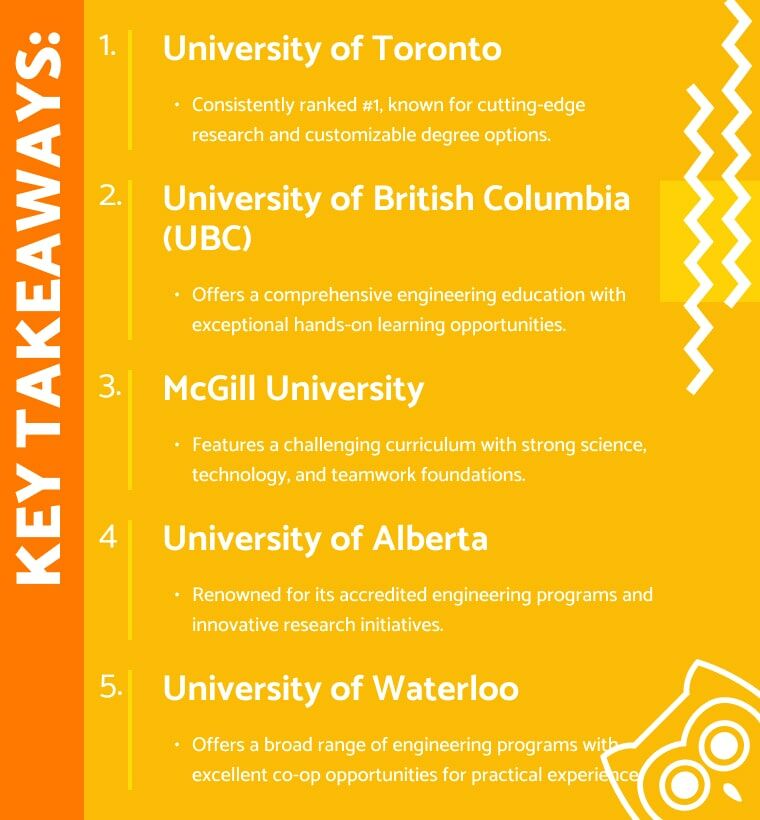Top Engineering Universities in Canada
Table of contents
- 1 Why Choosing the Right Engineering Program Matters?
- 2 Overview of Engineering Education in Canada
- 3 5 Factors to Consider When Choosing an Engineering Program
- 4 Admission Requirements and Application Process
- 5 Specialized Engineering Disciplines and Programs
- 6 Top 5 Engineering Universities in Canada
- 7 Career Opportunities and Industry Connections
- 8 Scholarships and Financial Aid for Engineering Students
- 9 Final Tips for Aspiring Engineers
Engineering science is a diverse field with many branches, such as materials engineering, environmental engineering, or chemical engineering. Accordingly, it requires specific skills, knowledge, and aptitude.
Choosing between engineering programs is a critical factor for your future career. This article will overview the best engineering programs to help you select a program for your engineering degree.
If you struggle with the choice and need help with application papers, feel free to address the Canadian essay writing service for academic assistance.
Why Choosing the Right Engineering Program Matters?
The engineering field is trendy due to the specialized set of skills it requires. The students are eager to learn to land a promising job in the future. This decision could make them quite wealthy in the long run.
On the other hand, university education means a lot. It gives a practical perspective and complies with hands-on situations on the job. The choice you make at the beginning will determine the level of knowledge you ultimately get!
Overview of Engineering Education in Canada
Canada is home to some of the world’s top engineering schools. It is known for producing technically proficient graduates who can tackle real-world challenges. No wonder many online universities in Canada offer comprehensive education programs.
Here’s what makes Canadian engineering education stand out:
- Program Duration. Undergraduate engineering programs typically span 4-5 years. Many universities offer co-op options, integrating academic study with paid work experience.
- Focus on Research. Canadian universities emphasize research and house state-of-the-art research centers. Students can work on cutting-edge projects and gain insights into technological advancements. Many institutions maintain strong connections with industry partners.
- Accreditation and Global Recognition. The Canadian Engineering Accreditation Board (CEAB) highly recognizes engineering programs in Canada. This accreditation ensures high standards of quality and rigor and makes Canadian graduates competitive globally.
5 Factors to Consider When Choosing an Engineering Program
When applying for engineering in Canada, ensure the program aligns with your academic and career goals. Here are some key considerations:
-
Specialization and Curriculum.
Engineering is a broad field with many specializations, including civil, mechanical, electrical, chemical, and computer engineering. Choosing a curriculum aligned with your interests and career aspirations is essential.
Some universities may have strengths in particular areas. Thus, you should check the course offerings and research opportunities before sending applications.
-
University Reputation and Rankings.
The reputation of the university and its engineering faculty impacts your education quality. Global rankings can provide insights into the research output and industry connections. While rankings shouldn’t be the sole factor in your decision, they can be a helpful guide.
-
Location and Campus Facilities.
The location of the university creates an overall impression. Urban universities may offer more industry connections and job opportunities. On the contrary, those in smaller towns may provide lower living expenses and a more friendly community.
Plus, consider the laboratories, libraries, and extracurricular activities to enhance your educational experience.
-
Co-op and Internship Opportunities.
Co-op programs and internships are valuable for gaining practical experience. Many Canadian universities offer co-op programs, which allow students to alternate between academic study and paid work placements.
These opportunities will give you a competitive edge in the job market. They will also help with assignments and applying theoretical knowledge in real-world settings.
-
Class Size and Student Support.
Smaller class sizes give you more personalized attention and better interaction with professors. Larger classes, on the other side, offer a more diverse group of peers. Besides, consider the availability of student support services, such as:
- Academic advising;
- Tutoring;
- Career counseling.
They can enhance your program’s success.
Admission Requirements and Application Process
Admission to Canadian engineering programs is competitive, with each university’s requirements. Generally, you’ll need:
- Strong academic background. Focus on subjects like calculus, physics, and chemistry. Top engineering universities in Canada often expect 85% or higher high school grades. Advanced Placement (AP) or International Baccalaureate (IB) courses can boost your application.
- Standardized tests. Some universities may ask for SAT or ACT scores, especially for international students, though it’s less common. Non-native English speakers usually need to take the TOEFL or IELTS.
- Application process. You must submit transcripts, test scores, a personal statement, and letters of recommendation. Some programs might also ask for a portfolio or interview. Ensure you complete as many credits to graduate college as possible.
- Deadlines. For programs starting in the fall, most application deadlines are in January or February. Applying early can help secure a spot, especially in competitive programs.
Be sure to check each university’s requirements and deadlines to stay on track.
Specialized Engineering Disciplines and Programs
Engineering is a diverse field with various specializations. Here’s a brief overview of some popular engineering disciplines offered at Canadian universities:
- Discipline
- Focus Areas
- Career Paths
Civil Engineering
Infrastructure design, construction, urban planning.
Construction, urban planning, environment.
Mechanical Engineering
Robotics, automotive, energy systems.
Manufacturing, aerospace, energy.
Electrical Engineering
Electricity, electronics, telecommunications.
Power generation, telecom, microelectronics.
Chemical Engineering
Chemical production, biotechnology, environmental engineering.
Pharmaceuticals, materials science.
Computer Engineering
Hardware/software development, AI, cybersecurity.
Tech industry, data science.
Top 5 Engineering Universities in Canada

University of Waterloo
The University of Waterloo, founded in 1957, is a public institution with over 30,000 students. It has satellite campuses in Cambridge, Kitchener, and Stratford. The tuition costs are usually higher for international students. Some graduate programs offer the same rates for both domestic and international students.
The Faculty of Engineering offers 15 undergraduate programs, including 14 professional engineering degrees and one prestigious architecture degree.
University of Toronto
The University of Toronto, established in 1827, is a public institution. Students from China, India, and the U.S. come here to study. Tuition is higher for international students.
The University of Toronto consistently ranks first in various lists each year. Its engineering program was the top choice in both 2022 and 2023.
University of Alberta
The Faculty of Engineering at the University of Alberta is a global leader in research. The engineering programs here are accredited by the Canadian Engineering Accreditation Board. The faculty also offers specialized graduate programs, both course-based and research-based.
University of British Columbia
UBC Engineering offers students exceptional learning opportunities. The students first learn about the main principles of engineering. After that, they can pursue a Bachelor of Applied Science (BASc) degree.
The UBC Engineering program is highly competitive, and your admission average is crucial in securing a spot.
McGill University
Students in the McGill Faculty of Engineering follow a tough curriculum. It strengthens their science skills and helps develop teamwork and communication abilities. All programs provide solid training in math, basic sciences, engineering, design, and related areas.
Career Opportunities and Industry Connections
Graduating from engineering programs in Canada opens up a world of career opportunities. Engineering graduates are in high demand both in Canada and globally. They have great technical skills, problem-solving abilities, and innovative thinking.
- Industry Demand. Canada’s robust economy creates a strong demand for engineers. Engineers are in demand in urban centers and resource-rich provinces. They drive innovation and maintain infrastructure.
- Global Opportunities. Canadian engineering degrees help graduates to find opportunities to work abroad. Whether in the United States or Europe, Canadian-trained engineers are sought after.
- Industry Connections. Top Canadian universities have lots of industry connections. They often have co-op programs and research partnerships. These connections enhance job prospects upon graduation. Many students secure job offers from their co-op employers thanks to their universities.
- Entrepreneurial Pathways. For those interested in entrepreneurship, engineering offers a strong foundation for launching startups. Many Canadian universities support entrepreneurial initiatives. They often provide incubators, mentorship, and funding opportunities.
Scholarships and Financial Aid for Engineering Students
Financing an engineering education can be a significant concern for many students. However, Canadian universities offer plenty of scholarships and grants to ease the burden.
1. University Scholarships.
Most universities offer merit-based scholarships for engineering students. These can cover a part or all the tuition fees. They often award these scholarships based on the following:
- Academic performance;
- Leadership qualities;
- Community involvement.
Some universities also offer entrance scholarships.
2. Government Grants and Loans.
The Canadian government is generous in grants that help students pursue higher education. The Canada Student Loans Program (CSLP) offers need-based loans. Meanwhile, grants are available for students from low- and middle-income families. Additionally, provincial governments may offer their grants and scholarships.
3. Industry-Sponsored Scholarships.
Many industries and professional organizations sponsor scholarships for engineering students. These scholarships may include internships or job placements as part of the award. Examples include scholarships from engineering societies, industry associations, and private companies.
4. Bursaries and Work-Study Programs
For students with financial need, universities often offer bursaries that do not need to be repaid. Additionally, work-study programs allow students to work part-time and cover their expenses. These programs help students gain practical skills and manage their finances.
Final Tips for Aspiring Engineers
Future engineers should approach their educational journey with a clear vision and a strategic plan. One of the first steps is to select an engineering program that aligns with personal interests and career goals.
You may focus on traditional fields, like:
- Civil engineering;
- Mechanical engineering;
- Electrical engineering;
- Biomedical engineering.
Or keep an eye on emerging areas such as environmental or biomedical engineering. Either way, choose a program that offers work opportunities and industry connections.
Students should also engage in extracurricular activities, such as:
- Joining engineering clubs;
- Participating in competitions;
- Seeking out internships.
This can provide valuable practical skills and help build a strong professional network. These experiences enhance both technical and soft skills like:
- Teamwork;
- Problem-solving;
- Communication.
Finally, aspiring engineers should remain open to continuous learning and adaptability. The proactive approach will make graduates more competitive in the job market. If you keep up with trends, you can advance in your career.







